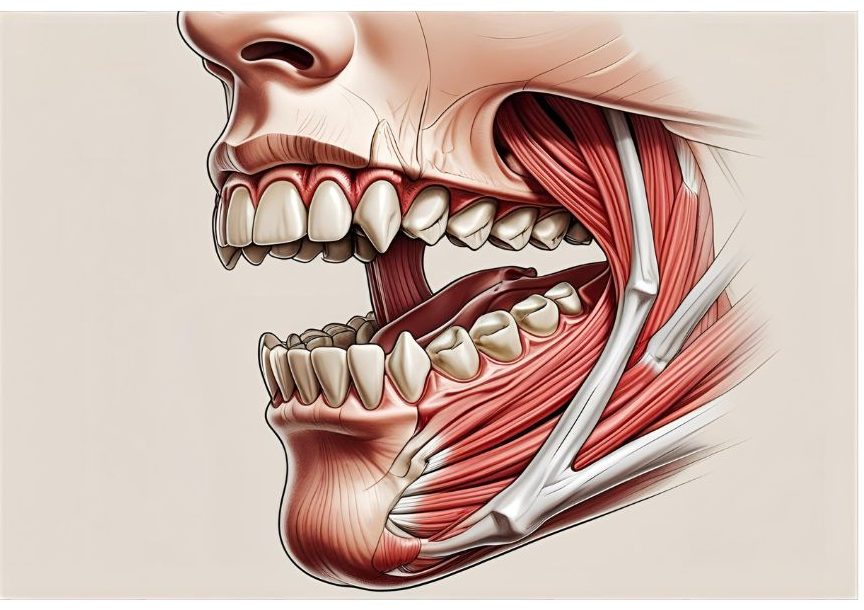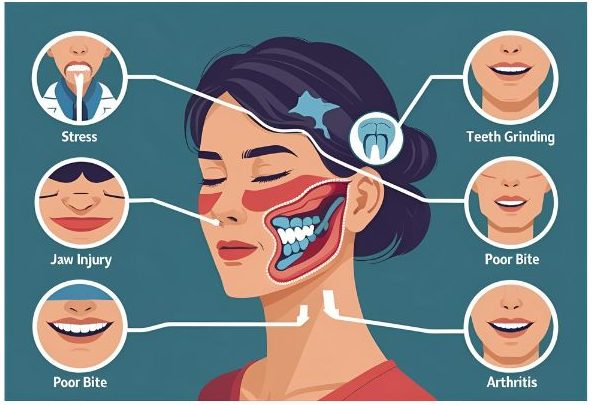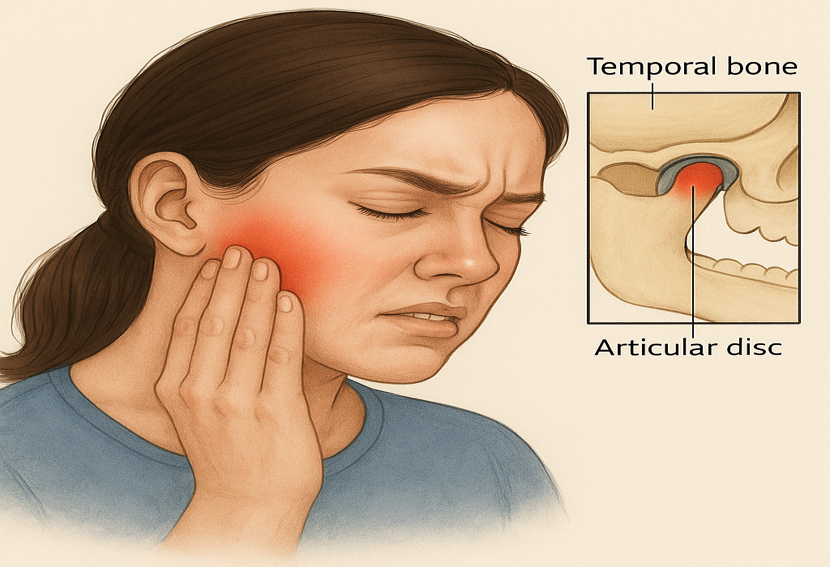Table of Contents
Reviewed by Dr. Manoj Sah, Ph.D. in TMJ Disorders, TMJ Specialist at The TMJ Clinic Nepal—the only TMJ specialist holding a Ph.D. degree in Nepal providing comprehensive treatment for all forms of TMJ-related disorders, TMDs, and Orofacial Pain.
Introduction
Do you often experience jaw pain, hear clicking sounds while chewing, or feel discomfort when opening your mouth wide? You may be suffering from a condition known as TMJ Disorder.
In this blog, you’ll learn what TMJ Disorder (TMD) is, its causes, symptoms, natural remedies, and medical treatment options. Plus, if you’re in Nepal, discover the best place for TMJ treatment in Nepal—The TMJ Clinic, led by Dr. Manoj Sah, the country’s only Ph.D. specialist in TMJ care.
🦷 What is TMJ Disorder (TMD)?

TMJ Disorder, often known as TMD (Temporomandibular Disorders), is a group of disorders that affect the muscles that control the movement of the jaw and produce pain and dysfunction in the jaw joint. TMJ issues are more prevalent than most people think, and if ignored, they can have a major negative influence on your quality of life.
⚠️ Common Causes of TMJ Disorder
Understanding what causes TMJ Disorder helps you manage and prevent it. Common triggers include:
1. Teeth Grinding or Bruxism
Bruxism, another name for teeth grinding, is one of the most frequent causes of TMJ disorder. Unknown to them, many people grind their teeth as they sleep. Over time, this causes discomfort and stiffness in the jaw joint (TMJ) due to increased pressure.
2. Jaw Injury or Trauma
The temporomandibular joint (TMJ) can suffer damage from an accident or injury close to your face or jaw. Even minor injuries can affect your jaw’s movement, which might eventually result in TMJ disorder.
3. Arthritis in the Jaw Joint
Similar to the hands and knees, arthritis can also affect the jaw joint. The TMJ becomes inflamed due to diseases like rheumatoid arthritis or osteoarthritis, which results in pain, swelling, and restricted jaw mobility.
4. Stress and Muscle Tension
One of the hidden triggers is stress. People may unknowingly clench their jaw or tense facial muscles when under stress. This behavior can lead to TMJ issues, causing jaw pain and tightness over time.
5. Poor Bite Alignment
A poor bite, also known as malocclusion, occurs when your upper and lower teeth do not fit together correctly. This puts more tension on the TMJ, forcing your jaw to work harder and potentially causing joint discomfort and TMJ disorder.

👨⚕️ Symptoms of TMJ Disorder in Adults
The following are the most typical indicators of TMJ disorder:
- Clicking, popping, or grating sounds when opening or closing the mouth
- Jaw locking, either open or closed
- Pain in the jaw, face, neck, or around the ears
- Difficulty chewing or discomfort when biting
- Headaches, earaches, and shoulder pain
- Swelling or tenderness around the jaw
If these symptoms persist, consult a TMJ specialist in Nepal or your local area.
🌿 How to Relieve TMJ Pain Naturally
In many cases, mild TMJ symptoms can be treated at home using natural remedies:
1)Use either cold or warm compresses to reduce inflammation.
2)To increase flexibility, use TMJ jaw exercises.
3)Eat soft foods instead of hard snacks or chewing gum
4)Maintain good posture, especially while using a phone or computer 5)Practice stress-reduction techniques like meditation or yoga

💉 Medical Treatment Options for TMJ Disorder
When symptoms worsen, medical intervention becomes necessary. Options include:
1)Custom splints or mouthguards to stabilize the jaw and decrease grinding
2)NSAIDs (anti-inflammatory medications) help reduce swelling and pain
3)Physical therapy helps increase the strength and mobility of the jaw
5)Injections of Botox relax tense jaw muscles
6)Surgical procedures (arthroscopy or open-joint surgery) for severe or chronic cases

📍Looking for expert care in Nepal?

If you’re in Nepal, the best TMJ treatment is available at The TMJ Clinic, led by Dr. Manoj Sah, a Ph.D. specialist in TMJ and Orofacial Pain. For those living abroad, virtual consultations and treatment planning services are also available, making expert TMJ care in Nepal accessible worldwide.
❓ When Should You See a TMJ Specialist?
You should consult a TMJ expert if:
- You experience jaw locking, frequent headaches, or persistent facial pain
- Natural remedies and medications don’t help
- You suspect bruxism or structural jaw misalignment
- You’ve had previous dental trauma or surgeries
Early diagnosis and care can prevent long-term complications and help restore your quality of life.
🧠 FAQ – TMJ Disorder Quick Answers
What is the best treatment for TMJ?
The best treatment for TMJ Disorder (TMD) depends on its cause and severity. Most cases are managed with a combination of treatments such as custom splints or mouthguards, physical therapy, Botox injections, and stress management techniques like meditation. In severe cases, surgical procedures such as arthroscopy may be needed
What is TMJ caused by?
The exact cause of TMJ disorder is often unclear. It may result from a combination of factors like teeth clenching, gum chewing, nail biting, stress, or underlying conditions such as fibromyalgia, osteoarthritis, or a jaw injury.
Is TMJ disorder permanent?
Not always. With the right treatment, most patients experience full relief.
Can TMJ cause dizziness or ear ringing?
Yes, TMJ can affect nearby nerves and muscles, causing symptoms like tinnitus or vertigo
What foods should I avoid with TMJ?
Avoid chewy, crunchy, or hard foods like nuts, gum, and raw vegetables.
Need Help With Jaw Pain?
Book an appointment with The TMJ Clinic Nepal
“Smile, Speak, and Eat Without Pain.”

Conclusion
TMJ Disorder is more than just jaw pain—it’s a medical condition that can affect your eating, speaking, and overall well-being. Whether caused by stress, injury, or misalignment, TMJ symptoms should never be ignored.
By understanding what TMJ disorder is and how it’s treated, you’re already on the path to recovery. Start with natural remedies, and if your symptoms persist, seek expert help. If you’re looking for specialized care, TMJ treatment in Nepal is available through Specialists like Dr. Manoj Sah, Nepal’s only Ph.D. in TMJ care.


